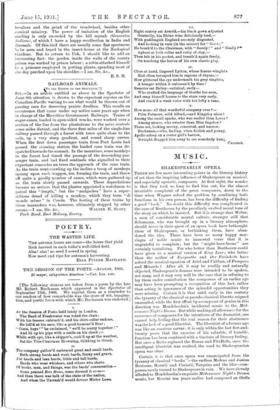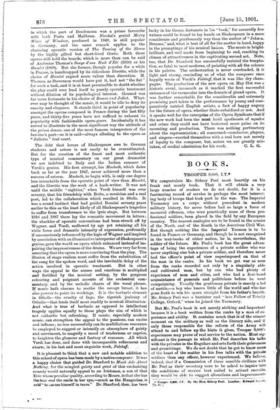MUSIC.
SHAKESPEARIAN OPERA.
THERE are few more interesting points in the literary history of art than the inspiring influence of Shakespeare on musical, and especially operatic, composers. At first sight, the wonder is that they took so long to find him out, for the almost invariable complaint of the great composers, down to the time when Wagner solved the problem by combining both functions in his own person, has been the difficulty of finding a good " book." No doubt this difficulty was complicated in the case of Beethoven by the peculiarly exalted moral tone of the story on which he insisted. But it is strange that Weber, a man of considerable mental culture, stranger still that Schumann, who was brought up in a literary atmosphere, should never in their quest of an opera book have bethought them of Shakespeare, or bethinking them, have aban- doned the idea. There have been so many happy mar- riages of noble music to immortal verse that it is ungrateful to complain; but the " might-have-beens " are certainly tantalising. For who bettor than Beethoven could have given us a musical version of King Lear ; who better than the author of Eurganthe and Der Freischiitz have solved the musical equation of Ariel and Caliban, of Prospero and Miranda ? After all, it may be readily and naturally objected, Shakespeare's dramas were intended to be spoken, not sung, and it may very well be the case that in refusing to lay them under contribution the composers of an earlier ago may have been prompting a recognition of this fact, rather than acting in ignorance of the splendid opportunities they were missing. Certain it is that until early in the century the tyranny of the classical or pseudo-classical libretto reigned unassailed, while the first effort by a composer of genius in this direction was Mendelssohn's incidental music to the Mid- summer Night's Dream. But while making all allowance for the reverence of composers for the intentions of the dramatist, one cannot help feeling that the real reason for their abstinence was the lack of a good librettist. The librettist of a former age was like an amateur carver: it is only within the last five-and- twenty years that the exercise of his valuable, if humble, function has been combined with a tincture of literary feeling. But once a Bo'ito replaced the Banns and FitzBalls, once the intelligent librettist was evolved, the road to Shakespearian opera was clear.
Certain it is that once opera, was emancipated from the tyranny of classical " books "—the endless Medeas and Junius Brutuses, Horatii and Curiatii, Tarquins and the like—com- posers rarely turned to Shakespeare in vain. We have already alluded to Mendelssohn's exquisite Midsummer Night's Dream music, but Rossini ten years earlier had composed an Otello
in which the part of Desdemona was a prime favourite with both Pasta and Malibran. Nicolas genial Merry Wives of Windsor, produced in 1849, is still popular in Germany, and the same remark applies to the charming operatic version of The Taming of the Shrew by the highly gifted but short-lived Goetz. Both these operas still hold the boards, which is more than can be said of Ambroise Thomas's Songs dune Nuit d'Ste (1850) or his Hamlet (1868). But the former, though popular for a while in France, is handicapped by its ridiculous libretto, while the choice of Hamlet argued more valour than discretion. M. Thomas, as Stevenson would have put it, had not "the fist". for such a task, and it is at least permissible to doubt whether the play could ever lend itself to purely operatic treatment without dilution of its psychological interest. Gounod was far more fortunate in his choice of Romeo and Juliet. What- ever may be thought of the music, it would be idle to deny its suavity and elegance. It stands third in point of popularity amongst the operas composed in France during the last fifty years, and thirty-five years have not sufficed to exhaust its popularity with fashionable opera-goers. Incidentally it has served to illustrate in the most significant way the attitude of the prima donna, one of the most famous interpreters of the heroine's part—so it is said—always alluding to the opera as " Juliette " tout court.
The debt that lovers of Shakespeare owe to German students and actors is not easily to be overestimated. But for the creation of the finest and most authentic type of musical commentary on our great dramatist we are indebted to Italy and the Indian summer of Verdi's genius. His first attempt, his Macbeth, which dates back as far as the year 1847, never achieved more than a success of esteem. Macbeth, to begin with, is only one degree less intractable from the operatic point of view than Hamlet, and the libretto was the work of a hack-writer. It was not until the middle " eighties," when Verdi himself was over seventy, that his friendship with Bdito, a musician and a real poet, led to the collaboration which resulted in Otello. It was a sound instinct that had guided Rossini seventy years earlier to this as the least likely of all Shakespeare's tragedies to suffer from transference to the lyric stage. But between 1816 and 1887 there lay the romantic movement in letters; the shackles of operatic conventions had been struck off by Wagner, and Verdi, mellowed by age yet retaining all his virile force and dramatic intensity of expression, profoundly if unconsciously influenced by the logic of Wagner and inspired by association with an illuminative interpreter of Shakespeare's genius, gave the world an opera which enhanced instead of im- pairing the impressiveness of the drama. We are very far from asserting that the opera is more convincing than the play. The illusion of stage realism must suffer from the substitution of the sung for the spoken word, and the inevitable delay of the action involved in operatic treatment. But in other ways the appeal to the senses and emotions is multiplied and fortified by the musical setting, by the gorgeous colouring and poignant accents of the orchestral com- mentary, and by the melodic charm of the vocal phrase. If music hath charms to soothe the savage breast, it has also powers to paint its workings. It is the barbaric element in Othello—the cruelty of Iago, the tigerish jealousy of Othello—that lends itself most readily to musical illuStration. And what is true of barbaric as opposed to intellectual tragedy applies equally to those plays the aim of which is not cathartic but refreshing. If music, especially modern music, can strengthen the appeal to the passions, can excite and inflame ; no less successfully can its multifarious resources be employed to suggest or intensify an atmosphere of gaiety and merriment, to magnify a mood of tenderness or caprice, to heighten the glamour and fantasy of romance. All which Verdi has done, and done with incomparable refinement and charm, in his last and most exquisite work, Falstaff.
It is pleasant to think that a new and notable addition to this school of opera has been made by a native composer. It was a happy choice that guided Dr. Stanford to Much Ado About Nothing, for the mingled gaiety and grief of this enclutilting comedy would naturally appeal to an- Irishman, a son of that Erin whose peculiar quality, according to Moore, is that she'has the tear and the smile in.her eye,—much as the Hungarian, is said " to amuse himself in tears." Dr. Stanford, then, has been lucky in his theme, fortunate in his "book," for assuredly few writers could be found to lay hands on Shakespeare in a more considerate and gentlemanly way than the author of "John-a. Dreams," and, what is best of all for the matter in hand, happy in the promptings of his musical 5411.461Y. The music is bright, brilliant, and well made from beginning to end, reaching its climax of attractiveness in the captivating second act. Note, too, that Dr. Stanford has successfully resisted the tempta- tion, so fatal to most moderns, of painting with all the colours in his palette. The orchestration is never overloaded, it is light and strong, reminding us of what the composer once happily wrote of Verdi's Falstaff, that it was like dry cham- pagne. The production of the new opera on May 31st was a historic event, inasmuch as it marked the first successful entrance of the vernacular into the domain of grand opera. It was further remarkable for the considerable and extremely promising part taken in the performance by young and com- paratively untried English artists, a fact of happy augury for the future of opera, whether State-subsidised or not. And it speaks well for the enterprise of the Opera Syndicate that if the new work had been the most lurid apotheosis of squalor and crime they could not have bestowed more pains on its mounting and production. There was nothing perfunctory about the representation; all concerned—conductor, players, and singers—exerted themselves with a zeal born not merely of loyalty to the composer, but, unless we are greatly mis-
taken, of cordial admiration for his work. C. L. G.











































 Previous page
Previous page